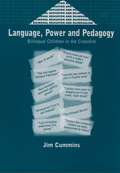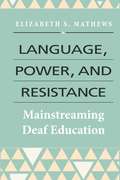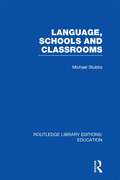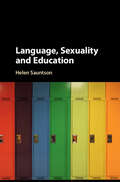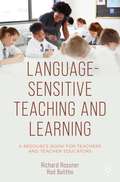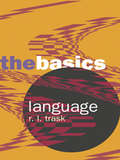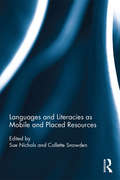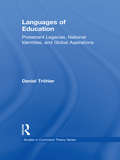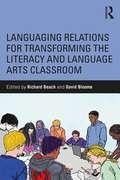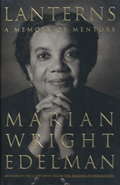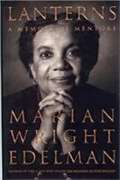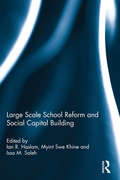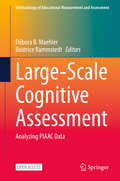- Table View
- List View
Language, Literacy, and Technology
by Richard KernFrom the origins of writing to today's computer-mediated communication, material technologies shape how we read and write, how we construe and share knowledge, and ultimately how we understand ourselves in relation to the world. However, communication technologies are themselves designed in particular social and cultural contexts and their use is adapted in creative ways by individuals. In this book, Richard Kern explores how technology matters to language and the ways in which we use it. Kern reveals how material, social and individual resources interact in the design of textual meaning, and how that interaction plays out across contexts of communication, different situations of technological mediation, and different moments in time. Showing how people have adapted visual forms to various media as well as to social needs, this study culminates in five fundamental principles to guide language and literacy education in a period of rapid technological and social change.
Language, Logic And God
by Frederick Ferré"THIS BOOK is an attempt to fill the present striking need for an introduction to contemporary linguistic philosophy as it bears on theological discourse. Wherever I have gone, recently, among educated Christians in Britain and America, I have encountered profound curiosity--and a good deal of anxiety--concerning modern methods in philosophy as they relate to the logical nature and validity of theological affirmations. Similarly I have found many of my students in contemporary philosophy and in the philosophy of religion becoming deeply absorbed in the issues raised by a critical examination of theological speech. From both groups, the intellectually alert Christians and the thoughtful graduate and undergraduate students of philosophy and religion, I have been heavily bombarded with appeals for direction to some book which would (1) set forth the central issues and arguments concerning theological discourse for readers who have familiarity with traditional philosophy but who are relatively untrained in contemporary philosophical practices and (2) place into perspective the present state of philosophical and theological discussion in this area of burgeoning interest. To my frustration, I have had to answer such requests with the admission that no such book exists and with the promise that I would try, some day, to provide that book myself. In preparing this volume, therefore, I have done my best to keep those promises in mind."
Language, Place, and the Body in Childhood Literacies: Theory, Practice, and Social Justice (Expanding Literacies in Education)
by Rachel Holmes Rosie Flewitt Abigail Hackett Christina MacRae Khawla Badwan Ruth Churchill Dower Warda Farah Vishnu Kk Nair David Ben ShannonChallenging dominant views of early childhood language development and knowledge, this thought-provoking volume illuminates the importance of place, the body, and movement in opening space for young children’s improvisatory, creative, playful language practices.Bringing together a rich collection of contemporary research and diverse perspectives, the book centers on the premise that ‘where’ talk happens—be it spoken, mimed, signed, or assisted through one or more communication tools—is not a neutral backdrop or controllable variable. Rather, it is deeply entangled in the emergence of language from bodies, in how these vocalizations make their way into the world, what they might feel like and set into motion, and how they are received, heard and listened to by other humans and by non-humans. Chapter authors introduce theories about language, body, and place, while also providing examples of what this work may look like in practice.This book is key reading for those who work with young children and families, including teachers, pre-service teachers studying child development, speech and language therapists, support workers, and those in the arts, cultural and environmental sectors. It is also highly relevant to researchers, literacy education scholars, and anyone who endeavors to think more expansively and critically about language and literacy in early childhood contexts.
Language, Power and Pedagogy
by Jim CumminsPopulation mobility is at an all-time high in human history. One result of this unprecedented movement of peoples around the world is that in many school systems monolingual and monocultural students are the exception rather than the rule, particularly in urban areas. This shift in demographic realities entails enormous challenges for educators and policy-makers. What do teachers need to know in order to teach effectively in linguistically and culturally diverse contexts? How long does it take second language learners to acquire proficiency in the language of school instruction? What are the differences between attaining conversational fluency in everyday contexts and developing proficiency in the language registers required for academic success? What adjustments do we need to make in curriculum, instruction and assessment to ensure that second-language learners understand what is being taught and are assessed in a fair and equitable manner? How long do we need to wait before including second-language learners in high-stakes national examinations and assessments? What role (if any) should be accorded students' first language in the curriculum? Do bilingual education programs work well for poor children from minority-language backgrounds or should they be reserved only for middle-class children from the majority or dominant group? In addressing these issues, this volume focuses not only on issues of language learning and teaching but also highlights the ways in which power relations in the wider society affect patterns of teacher-student interaction in the classroom. Effective instruction will inevitably challenge patterns of coercive power relations in both school and society.
Language, Power, and Resistance: Mainstreaming Deaf Education
by Elizabeth S. MathewsThe current policy of educating d/Deaf and h/Hard of hearing (DHH) students in a mainstream setting, rather than in the segregated environments of deaf schools, has been portrayed as a positive step forward in creating greater equality for DHH students. In Language, Power, and Resistance, Elizabeth S. Mathews explores this claim through qualitative research with DHH children in the Republic of Ireland, their families, their teachers, and their experiences of the education system. While sensitive to the historical context of deaf education, Mathews focuses on the contemporary education system and the ways in which the mainstreaming agenda fits into larger discussions about the classification, treatment, and normalization of DHH children. The research upon which this book is based examined the implications that mainstreaming has for the tensions between the hegemonic medical model of deafness and the social model of Deafness. This volume explores how different types of power are used in the deaf education system to establish, maintain, and also resist medical views of deafness. Mathews frames this discussion as one of power relations across parents, children, and professionals working within the system. She looks at how various forms of power are used to influence decisions, to resist decisions, and to shape the structure and delivery of deaf education. The author’s findings are a significant contribution to the debates on inclusive education for DHH students and will resonate in myriad social and geographic contexts.
Language, Power, and the Economics of Education in Morocco (Language Policy #35)
by Mohammed ErrihaniThis volume provides a comprehensive understanding and assessment of language policy in education in Morocco. All aspects related to language policy and the effect on the education sector for more than half a century in Morocco are included in the book. The book traces the role that the linguistic medium has played in the educational system in Morocco since its independence from the French in 1956. It examines the role that various language policies have played in the educational sector and provides an in-depth analysis of the most recent language policy recognizing Berber, making it an official language and a mandatory subject in all schools. As such, this book is on the cutting edge of language policy as it also examines a policy that is still being rolled out.It also addresses the role of political pressure, and social and political conflict on language policy in Morocco, and how the linguistic medium has failed to guarantee the basic goals of equity, equality and social justice that assure a decent future for every citizen.
Language, Race, and Power in Schools: A Critical Discourse Analysis (Routledge Research in Education)
by Pierre W. OrelusIn this edited collection, authors from various academic, cultural, racial, linguistic, and personal backgrounds use critical discourse analysis as a conceptual framework and method to examine social inequities, identity issues, and linguistic discrimination faced by historically oppressed groups in schools and society. Language, Race, and Power in Schools unravels the ways and degrees to which these groups have faced and resisted oppression, and draws on critical discourse analysis to examine how multiple forms of oppression intersect. This volume interrogates areas of discrimination and injustice and discusses possibilities of developing coalitions and concerted efforts across the lines of diversity.
Language, Schools and Classrooms (Routledge Library Editions: Education)
by Michael StubbsThe role of language is central in education – but there is much debate about the exact relation between children’s language and their educational success. The author provides a clear guide to the basic issues in the debates over language deficit, standard English and classroom language, and in this edition he shows how work in sociolinguistics can give a better understanding of the place of language in education and society.
Language, Sexuality and Education
by Helen SauntsonPresenting a range of data obtained from secondary schools in the UK and US, this path-breaking book explores the role played by language in constructing sexual identities. Analysing the often complex ways in which homophobia, heterosexism and heteronormativity are enacted within school contexts, it shows that by analysing language, we can discover much about how educators and students experience sexual diversity in their schools, how sexual identities are constructed through language, and how different statuses are ascribed to different sexual identities.
Language, Youth and Identity in the 21st Century
by Jacomine Nortier Bente A. SvendsenThe language of young people is central in sociolinguistic research, as it is seen to be innovative and a primary source of knowledge about linguistic change and the role of language. This volume brings together a team of leading scholars to explore and compare linguistic practices of young people in multilingual urban spaces, with analyses ranging from grammar to ideology. It includes fascinating examples from cities in Europe, Africa, Canada and the US to demonstrate how young people express their identities through language, for example in hip-hop lyrics and new social media. This is the first book to cover the topic from a globally diverse perspective, and it investigates how linguistic practices across different communities intersect with age, ethnicity, gender and class. In doing so it shows commonalities and differences in how young people experience, act and relate to the contemporary social, cultural and linguistic complexity of the twenty-first century.
Language-Sensitive Teaching and Learning: A Resource Book for Teachers and Teacher Educators
by Richard Rossner Rod BolithoThis textbook aims to raise teachers’ language awareness, to emphasise the importance of language and communication in enabling young people to reach their potential, and to develop their knowledge of how language and communication function in educational environments as well as outside. Laid out in a clear five-unit structure, and complemented by a range of classroom activities, reflective exercises, and case study examples from around the world, this book addresses the need for teachers to become more linguistically aware and sensitive in an accessible and reader-friendly way. It is an essential resource for pre-service and in-service teachers working with a range of age groups across the curriculum.
Language-in-education Policies
by Anthony J. LiddicoatThis book examines the ideological underpinnings of language-in-education policies that explicitly focus on adding a new language to the learners' existing repertoire. It examines policies for foreign languages, immigrant languages, indigenous languages and external language spread. Each of these contexts provides for different possible relationships between the language learner and the target language group and shows how in different polities different understandings influence how policy is designed. The book develops a theoretical account of language policies as discursive constructions of ideological positions and explicates how ideologies are developed through an examination of case studies from a range of countries. Each chapter in this book takes the form of a series of three in-depth case studies in which policies relating to a particular area of language-in-education policy are examined. Each case examines the language of policy texts from a critical perspective to deconstruct how intercultural relationships are projected.
Language: The Basics (The Basics)
by R.L. TraskWhat makes human language unique?Do women speak differently from men?Just what is the meaning of "meaning"?Language: The Basics provides a concise introduction to the study of language. Written in an engaging and entertaining style, it encourages the reader to think about the way language works. It features: * chapters on 'Language in Use', 'Attitudes to Language', 'Children and Language' and 'Language, Mind and Brain'* a section on sign language* a glossary of key terms* handy annotated guides to further reading.Providing an accessible overview of a fascinating subject, this is an essential book for all students and anyone who's ever been accused of splitting an infinitive.
Languages and Literacies as Mobile and Placed Resources
by Sue Nichols Collette SnowdenLanguages and Literacies as Mobile and Placed Resources explores how languages and literacies are implicated in the complex relationship between place and mobility. It is a book that represents the next wave in literacy studies in which theories of mobility, networking and globalisation have emerged to account for the dynamic landscape of globally circulating communication resources. Authors in this volume take up a more complex way of thinking about resources, applying it to consider languages and literacies as assemblages or as parts of assemblages that are involved in learning, teaching and meaning-making. The book addresses forms of text and mobility that arise in contexts outside of formal education including marketing, charity, journalism, community organisation and parenting. It also addresses school contexts and higher education settings. Key topics explored include: Consequences of workplace confinement Literacies as placed resources in the context of rural communities Literacy, sustainability and landscapes for learning Documenting networked knowledge on tablets Mobilising literacy policy through resources Global Englishes as placed resources Languages as contextualised resources Shaping a digital academic writing resource in a transcultural space With an international range of carefully chosen contributors, this book is a must read text for all academics interested in semiotics and literacy studies.
Languages and Literary Cultures in Hyderabad
by Kousar J. AzamThere is great interest in recent scholarship in the study of metropolitan cultures in India as evident from the number of books that have appeared on cities such as Delhi, Mumbai, Chennai and Kolkata. Though Hyderabad has a rich archive of history scattered in many languages, very few attempts have been made to bring this scholarship together. The papers in this volume bring together this scholarship at one place. They trace the contribution of different languages and literary cultures to the multicultural mosaic that is the city of Hyderabad How it has acquired this uniqueness and how it has been sustained is the subject matter of literary cultures in Hyderabad. This work attempts to trace some aspects of the history of major languages practiced in the city. It also reviews the contribution of the various linguistic groups that have added to the development not just of varied literary cultures, but also to the evolution of an inclusive Hyderabadi culture. The present volume, it is hoped, will enthuse both younger and senior scholars and students to take a fresh look at the study of languages and literary cultures as they have evolved in India's cities and add to the growing scholarship of metropolitan cultures in India.
Languages in the Malaysian Education System: Monolingual strands in multilingual settings (Routledge Critical Studies in Asian Education)
by Asmah Haji OmarThis book provides an overview of language education in Malaysia, covering topics such as the evolution of the education system from pre-independence days to the present time, to the typology of schools, and the public philosophy behind every policy made in the teaching of languages. The book consists of chapters devoted to the teaching of languages that form separate strands but are at the same time connected to each other within the education system. These chapters discuss: Implementing the national language policy in education institutions English in language education policies and planning in Malaysia Chinese and Tamil language education in Malaysia Teaching of indigenous Malaysian languages The role of translation in education in Malaysia It also discusses the development of language which enables the national language, Malay, to fulfil its role as the main medium of education up to the tertiary level. This book will be of interest to researchers studying language planning, teacher education and the sociology of education, particularly, within the Malaysian context.
Languages of Education: Protestant Legacies, National Identities, and Global Aspirations (Studies in Curriculum Theory Series)
by Daniel TröhlerIn this landmark contribution to the study of the formation of the modern school, Daniel Tröhler applies one of the most recognized methods of historical research to an analysis of the "language" of the academic discipline of education. Arguing the value of looking at languages rather than arguments--langues rather than paroles--this method of historical research is used to examine the background of different philosophies, theories, or arguments of education, specifically republicanism and Protestantism. Tröhler’s argument is that such analysis is essential to tracing back educational arguments to the ideological core of their concerns, and thus to understanding in international perspective the historical development of education systems and organizations and to evaluating their different theoretical and political approaches and claims. Elegantly written, with the historian’s attention to archival material, this book enables the reader to understand the complex and different social, cultural, religious, and political context factors embedded in the "thought" of schooling and its objects of scrutiny--its notions of the child and teacher. Languages of Education is essential reading for scholars and students across the fields of history and philosophy of education, curriculum studies, and comparative education.
Languages other than English in Australian Higher Education: Policies, Provision, and the National Interest (Language Policy #17)
by Jennifer Joan BaldwinThis book researches the study of languages other than English, and their place in the Australian tertiary sector. Languages are discussed in the context of the histories of Australian universities, and the series of reports and surveys about languages across the second half of the twentieth century. It demonstrates how changes in the ethnic mix of society are reflected in language offerings, and how policies on languages have changed as a result of societal influences. Also discussed is the extent to which influencing factors changed over time depending on social, cultural, political and economic contexts, and the extent to which governments prioritised the promotion and funding of languages because of their perceived contribution to the national interest.The book will give readers an understanding as to whether languages have mattered to Australia in a national and international sense and how Australia’s attention to languages has been reflected in its identity and its sense of place in the world.
Languaging Relations for Transforming the Literacy and Language Arts Classroom
by Richard Beach David BloomeApplying a languaging perspective, this volume frames the teaching and learning of literacy, literature, language, and the language arts as social and linguistic actions that generate new questions to make visible social, cultural, psychological, linguistic, and educational processes. Chapter authors explore diverse aspects of a languaging framework, the perspective of language as a series of ongoing and evolving interactional social actions and processes over time. Based on their research, the authors suggest directions for addressing substantive engagement as well as the marginalization, superficiality, and violence (symbolic and otherwise) that characterize the educational experience of so many students. Responding to the need to foster and support students’ intellectual, social, and affective worlds, this book showcases how languaging relations among teachers and students can deepen interactions and engagement with texts; enhance understandings of agency, personhood, and power relations in order to transform literacy, literature, and language arts classrooms; and improve the lives of teachers and students in educational settings.
Lanterns
by Marian Wright EdelmanI am grateful beyond words for the example of the lanterns shared in this memoir whose lives I hope will illuminate my children's, your children's, and the paths of countless others coming behind.--Marian Wright Edelman, from the PrefaceMarian Wright Edelman, "the most influential children's advocate in the country" (The Washington Post), shares stories from her life at the center of this century's most dramatic civil rights struggles. She pays tribute to the extraordinary personal mentors who helped light her way: Martin Luther King, Jr., Robert F. Kennedy, Fannie Lou Hamer, William Sloane Coffin, Ella Baker, Mae Bertha Carter, and many others.She celebrates the lives of the great Black women of Bennettsville, South Carolina-Miz Tee, Miz Lucy, Miz Kate-who along with her parents formed a formidable and loving network of community support for the young Marian Wright as a Black girl growing up in the segregated South. We follow the author to Spelman College in the late 1950s, when the school was a hotbed of civil rights activism, and where, through excerpts from her honest and passionate college journal, we witness a national leader in the making and meet the people who inspired and empowered her, including Dr. Benjamin E. Mays, Howard Zinn, and Charles E. Merrill, Jr.Lanterns takes us to Mississippi in the 1960s, where Edelman was the first and only Black woman lawyer. Her account of those years is a riveting first-hand addition to the literature of civil rights: "The only person I recognized in the menacing crowd as I walked towards the front courthouse steps was [a] veteran New York Times reporter. He neither acknowledged me nor met my eyes. I knew then what it was like to be a poor Black person in Mississippi: alone." And we follow Edelman as she leads Bobby Kennedy on his fateful trip to see Mississippi poverty and hunger for himself, a powerful personal experience for the young RFK that helped awaken a nation's conscience to child hunger and poverty. Lanterns is illustrated with thirty of the author's personal photographs and includes "A Parent's Pledge" and "Twenty-five More Lessons for Life," an inspiration to all of us-parents, grandparents, teachers, religious and civic leaders-to guide, protect, and love our children every day so that they will become, in Marian Wright Edelman's moving vision, the healing agents for national transformation.
Lanterns: A Memoir of Mentors
by Marian Wright EdelmanMemoir by founder of the Children's Defense Fund with portraits of the many mentors who helped shape her.
Large Scale School Reform and Social Capital Building
by Myint Swe Khine Issa M. Saleh Ian R. HaslamThis book introduces and explores the nature of large scale reform, and offers a fresh insight into the importance of social capital and professional development leadership for teachers and school management. It synthesizes research on the role of the professional development leader and the importance of social capital in schools, and examines its potential to impact large scale, system-wide, reform projects. The text presents a range of international examples and theories from renowned researchers and educationists, which illustrate the challenge of raising the prominence of education social capital in schools. Considering crucial research that informs effective adult learning interventions, underlying themes supporting constructivist and transformative interventions are identified and woven into the narrative. Factors and variables needed to encourage and implement initiatives are examined, and each section is accompanied by case studies from around the world. The book is split into five sections and twelve parts which include: -The Lesson of Large Scale Reform for Leadership Development-Assessment of Wide Scale Educational Reform Initiatives-Developing Social Capital through National Education Reform-System Improvement through Professional Learning Communities Large Scale School Reform and Social Capital Building will be of interest to policy makers and system reform leaders, along with researchers and postgraduate students with a focus on continuous professional development, educational reform and school leadership.
Large-Scale Cognitive Assessment: Analyzing PIAAC Data (Methodology of Educational Measurement and Assessment)
by Débora B. Maehler Beatrice RammstedtThis open access methodological book summarises existing analysing techniques using data from PIAAC, a study initiated by the OECD that assesses key cognitive and occupational skills of the adult population in more than 40 countries. The approximately 65 PIAAC datasets that has been published worldwide to date has been widely received and used by an interdisciplinary research community. Due to the complex structure of the data, analyses with PIAAC datasets are very challenging. To ensure the quality and significance of these data analyses, it is necessary to instruct users in the correct handling of the data. This methodological book provides a standardised approach to successfully implementing these data analyses. It contains examples of and tools for the analysis of the PIAAC data using different statistical approaches and software, and it offers perspectives from various disciplines. The contributing authors have hands-on experience of using PIAAC data, and/or they have conducted data analysis workshops with these data.
Large-Scale Studies in Mathematics Education
by Stephen Hwang James A. Middleton Jinfa CaiIn recent years, funding agencies like the Institute of Educational Sciences and the National Science Foundation have increasingly emphasized large-scale studies with experimental and quasi-experimental designs looking for 'objective truths' Educational researchers have recently begun to use large-scale studies to understand what really works, from developing interventions, to validation studies of the intervention, and then to efficacy studies and the final "scale-up" for large implementation of an intervention. Moreover, modeling student learning developmentally, taking into account cohort factors, issues of socioeconomics, local political context and the presence or absence of interventions requires the use of large data sets, wherein these variables can be sampled adequately and inferences made Inroads in quantitative methods have been made in the psychometric and sociometric literatures, but these methods are not yet common knowledge in the mathematics education community. In fact, currently there is no volume devoted to discussion of issues related to large-scale studies and to report findings from them This volume is unique as it directly discusses methodological issue in large-scale studies and reports empirical data from large-scale studies.



